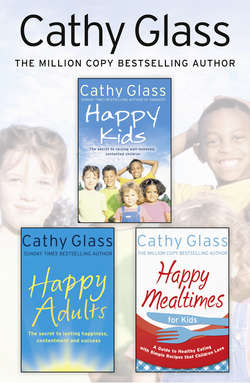Читать книгу Cathy Glass 3-Book Self-Help Collection - Cathy Glass, Cathy Glass - Страница 54
Bereavement
ОглавлениеClearly you will be acutely aware of this factor, and will be helping your child through their loss in any way you can – by talking, reassuring and giving lots and lots of cuddles. You will also probably be having to deal with your own sorrow at the passing of a loved one, and it is acceptable for you to show your child just how upset you are. When dealing with bereavement, many parents feel they have to put on a brave face and hide their emotion for the sake of their child. This will not help you, and will also discourage your child from expressing their own pain and sorrow. Adults usually deal with bereavement by crying, feeling very sad and talking to others about their dearly departed. Children do too, to some extent, but they can also become very angry when someone close dies, feeling they have been cheated by having their loved one taken away. This is very true of boys who, because of gender stereotyping, may not feel able to shed tears and share their grief, with the result that it ‘pressure cooks’ until the lid blows off.
One twelve-year-old boy I know, who lost his father in a road accident, appeared to cope with his pain remarkably well. He continued going to school and doing his homework, helped his mother all he could and reassured his younger brother. Six months later he was truanting, swearing and getting into fights, and eventually he got into trouble with the police. By not admitting to or sharing his grief, feeling that his mother already had enough to cope with, he’d bottled it up to the point where all his anger at the loss of his father had to come out and exploded into his behaviour. His mother had understandably been so immersed in her own sorrow, and keeping things going in the house, that she hadn’t noticed the warning signs in her son. Fortunately, with the help of a bereavement counsellor the boy was able to express his grief and anger at losing his dad, and eventually got his life back on track.
While it can be difficult for a parent to keep in place a routine and boundaries in the midst of grieving, it is also crucial to try to do so. A familiar routine, with familiar boundaries, feels safe and secure for the child when everything else in their life is falling apart and out of control. Talk to your child about the loss you are both experiencing and work through the grieving process, with the routine and boundaries for good behaviour still in place. So that if Tom is suddenly confrontational, angry and swearing at you, you can say, ‘Tom, love, I know how upset you are. We are both very upset, but you’re not going to speak to me like that. It doesn’t help and you know I don’t have swearing.’ This lets Tom know you have recognised his hurt and anger but that the foundations of his life are reassuringly unaltered. The same applies to bedtimes, mealtimes, homework – in fact all the boundaries and expectations you had before the bereavement. What wasn’t acceptable behaviour before the bereavement still isn’t.
It is worth noting that a child may be greatly affected (more so than an adult) by the news of the death of someone they weren’t particularly close to – for example, a distant relative, a child at school, someone who knows someone or even a pet. Children are in the early stages of coming to terms with the concept of mortality and the finality of death (it’s an on-going process throughout life), and can be affected far more than we might realise by such news.
I was once taken completely off guard when I had a phone call from my son’s school saying he had been put in detention after being very rude to a teacher. When he came home, somewhat subdued, it took me most of the evening to discover what was wrong. His pet hamster, Gerry, had died the night before and while he hadn’t said much to me at the time, I’d assumed he was all right. We’d had many pets and had therefore experienced them dying before but he’d suddenly felt the need to confide the passing of Gerry to his best friend in the middle of RE. The teacher had asked what was so pressing that he had to talk when she was, and he’d told her it was none of her business and was put in detention. While I sympathised with him, and said we should have talked about Gerry, I also said he shouldn’t have been rude to the teacher. He was fourteen at the time and had tears in his eyes as he said how he wished pets didn’t have to die.
